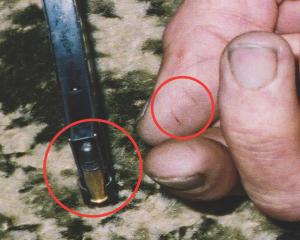Retired Canadian Supreme Court judge Ian Binnie came to New Zealand in July to assess Mr Bain's claim for compensation after his wrongful imprisonment, and Judith Collins received his report in early September.
Cabinet will ultimately decide whether to pay Mr Bain.
Mrs Collins was supposed to release her decision about the claim before Christmas, but Prime Minister John Key told Newstalk ZB this morning that was now unlikely.
"I think it's a recommendation she doesn't agree with, or at least has concerns about."
Mr Bain had served almost 13 years of his minimum 16-year life sentence when the Privy Council quashed his convictions in 2007 and ordered a retrial. He was acquitted after the three-month retrial in Christchurch in 2009.
Former justice minister Simon Power chose an overseas judge to examine Mr Bain's application for compensation because of the high-profile nature of the case in New Zealand.
Justice Binnie interviewed Mr Bain and other people, including the police, whom the defence accused of planting a spectacle lens, a key piece of evidence in the prosecution case.
His report is confidential, but The New Zealand Herald reported in September it had learned Justice Binnie believes that on the balance of probabilities, Mr Bain is innocent of murdering his parents, brother and two sisters.
He could be looking at a payout of close to $2 million for non-pecuniary losses such as liberty and emotional harm, and more for pecuniary losses such as loss of livelihood, in compensation for the almost 13 years he spent in prison.
Those figures are based on the formula the Cabinet used for non-pecuniary losses in its last compensation payment, made in April last year.
But compensation is by no means certain and the Government has no obligation to pay it.
Mr Bain was described as "penniless" by his lawyer, Michael Reed QC, when the application for compensation was lodged in March 2010.
Most legal experts at the time thought Mr Bain would find it difficult to meet the criteria for a compensation payment.
The Cabinet faces a difficult decision over Justice Binnie's findings because of the polarised views about Mr Bain's innocence and because his case falls outside the 1998 guidelines for compensation for wrongful conviction and imprisonment.
Under those guidelines, eligible claimants must have had a pardon or had their convictions quashed on appeal without the order of a retrial.
But it has the discretion to pay compensation if it is convinced there are "extraordinary circumstances".
And there is a precedent for compensation in a case that falls outside the guidelines.
Last year, Aaron Farmer was paid $351,575 by the Government and received a statement of innocence and an apology for his conviction in 2005 for rape. He served two years and three months of an eight-year sentence.
The Court of Appeal quashed his conviction in 2007 and ordered a retrial, but the retrial never went ahead after DNA testing before it excluded Mr Farmer as being the offender.
Former New Zealand High Court judge Robert Fisher conducted the inquiry for the Government into that case.
For his 819 days in prison, Mr Farmer received $336,575 (or $410 a day) and an additional $15,000 for "improper conduct" by a police detective when interviewing him.
If a similar formula were applied to 13 years' imprisonment, the figure would be $1.94 million, with possible add-ons for pecuniary loss and improper conduct by the authorities.
- Audrey Young and Newstalk ZB




